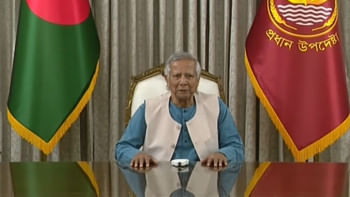Myanmar's Enemy Within: Buddhist Violence and the Making of a Muslim “Other”

As Bangladesh continues to grapple with the massive influx of Rohingya refugees, an unprecedented spotlight has been shone on the human rights record of the Myanmar government and the future of democracy in that country. Many, in the region and beyond, are trying to make sense of the widespread brutal violence that has driven the Rohingya from their homes. In search for answers about the causes of this ongoing humanitarian catastrophe and political crisis, a new book by British journalist Francis Wade offers some thought provoking insights.
In Myanmar's Enemy Within: Buddhist Violence and the Making if a Muslim 'Other,' published in August 2017 right as the most recent pogrom began, Wade delves into the complex ethnic, cultural, and religious factors that define the contentious relationship between Buddhists and Muslims in Rakhine. Though he identifies the 2012 rape and murder of a young Buddhist woman by a group of "Bengali Muslim" men, so reported in the local press, as a recent critical juncture in the worsening inter-communal conflict, he argues that in order to truly understand the vitriol towards the Rohingya, we must trace the colonial roots of population movements and identity formation. Particularly consequential to the administrative ordering of peoples was the British obsession with racial classification which, Wade contends, introduced boundaries between groups along ethnic and religious lines. These social cleavages would endure post independence and become formalized as part of the state building project.
Dissecting the contemporary body politic of Myanmar, Wade examines the role of powerful actors that steer both institutions of governance as well as public discourse, including the ruling elite and powerful right-wing monks. The book's analysis of the Ma Ba Tha movement, and the social grip it holds, is especially damning, but Wade's critiques are generally nuanced, detailed, and grounded in evidence.
While acknowledging the extremely tight grip on power that the military — or tatmadaw — continues to maintain, Wade does not shy away from criticizing the failure in leadership of Aung San Suu Kyi and her party, the National League for Democracy, in the face of growing intolerance. Despite some fledgling democratic reforms, Myanmar is far from a democracy — in spirit or authority — and if Wade's account is to be believed, there is little reason for optimism. The Rohingya are unlikely to be able to return safely anytime soon, if ever, and the persecution of other minorities, many of whom are in armed conflict with the state, will probably endure. This is about more than securing the borders or counterinsurgency, irrespective of what Naypyidaw would have us believe.
Central to Wade's story is the Bamar majority's conceptualization of the nation — what it stands for and who belongs. The Rohingya, in both the public imagination as well as under citizenship laws, fall squarely outside, and thus are unable to make any legitimate claims to the land on which they have lived for generations. In addition to detailing the tyranny of the majority, Wade reveals that "othering" is not exclusive to the Rohingya, or even in Muslims, but rather a broad swathe of non-Bamar people, including those who are recognized as citizens.
Wade also uncovers the performativity of belonging that some members of minority groups have adopted as mechanisms for self-preservation or advancement. Take, for example, the story of a Mon State woman whose family moved to Yangon in the late 1980s. They deliberately assimilated into the Bamar Buddhist majority, Wade recounts, stripping themselves of their original ethnic identity in order to become fully Bamar Buddhists because of the tangible privileges and protections that this legal and social classification bears. Throughout the book, anecdotes and personal stories like this serve as moving testimonies about the psyche of the oppressors and the oppressed. The book, however, could have done more to highlight the economic and geopolitical factors that have shaped the trajectory of Myanmar in the last several years. This, perhaps, represents an area of future work, particularly in light of how the ongoing mass expulsion of the Rohingya has unfolded.
In touching on themes of nationhood, nationalism, assimilation, and contentious politics, Wade's book is evocative of the writings of intellectual heavyweights such as Benedict Anderson (Imagined Communities, 1983), Rogers Brubakers(Ethnicity Without Groups, 2004), Ernest Gellner (Nations and Nationalism, 1983), Donald Horowitz (Ethnic Groups in Conflict, 1985), and Charles Tilly (Identities, Boundaries and Social Ties, 1985). Wade's, however, is not an academic book and therefore should appeal to a wide audience. An easy and compelling read, it is sure to be of interest to students, scholars, policymakers, and the general public who seek to better understand the transformative social and political changes that are taking place in Myanmar and how these changes fit into the history of a divided society.
Mayesha Alam, based at Yale University, is the author of Women and Transitional Justice: Progress and Persistent Challenges in Retributive and Restorative Processes (Palgrave Macmillan 2014).


 For all latest news, follow The Daily Star's Google News channel.
For all latest news, follow The Daily Star's Google News channel. 



Comments